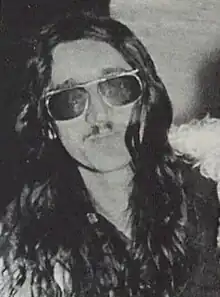| Vincent Crane | |
|---|---|
 Crane in 1970 | |
| Background information | |
| Birth name | Vincent Rodney Cheesman |
| Born | 21 May 1943 Reading, Berkshire, England |
| Died | 14 February 1989 (aged 45) Westminster, London, England |
| Genres | |
| Instrument(s) | |
| Years active | 1967–1989 |
Vincent Rodney Cheesman (21 May 1943 – 14 February 1989), known professionally as Vincent Crane, was an English keyboardist, best known as the organist for the Crazy World of Arthur Brown and Atomic Rooster. Crane co-wrote "Fire", the 1968 hit single by the Crazy World of Arthur Brown.
Biography
Born Vincent Rodney Cheesman in Reading, Berkshire, he taught himself boogie woogie piano as a teenager before attending Trinity College of Music between 1961 and 1964.[1] Influenced by Graham Bond,[2] he took up Hammond organ. In late 1966 he formed the Vincent Crane Combo, which comprised bass player Binky McKenzie, sax player John Claydon and drummer Gordon Hadler. In 1967 he teamed up with Arthur Brown in the Crazy World of Arthur Brown. Their debut album, The Crazy World of Arthur Brown (1968) contained the song "Fire", co-written by Crane and a chart-topping hit single in the United Kingdom, the United States and Canada, featuring Crane's organ and brass arrangements.
During their first tour of the United States in 1968, Crane had a nervous breakdown and returned to the United Kingdom where he spent 3 or 4 months in the mental hospital at Banstead.[1] Crane rejoined the band but on a subsequent tour of the United States, the band disintegrated in June 1969 when Arthur Brown temporarily disappeared to a commune[1] and Crane and drummer Carl Palmer left to form Atomic Rooster,[3] playing their first concert at the Lyceum in London on 29 August headlining over Deep Purple.[1] Atomic Rooster enjoyed success in 1971 with two hit singles, "Tomorrow Night" (written by Crane) and "Devil's Answer". Crane was the one constant member of the band through their many changing lineups, and wrote a slim majority of their material.
Atomic Rooster published their first eponymous album in 1970, and then drummer Carl Palmer left to form Emerson, Lake & Palmer that same year.
Crane lived with bipolar disorder from at least 1968 onwards,[1] periodically necessitating treatment at both out- and inpatient mental health treatment facilities.[3]
He collaborated with other musicians on a number of albums, including Rory Gallagher (Rory Gallagher, 1971), Arthur Brown (Faster Than the Speed of Light, 1979), Peter Green, Richard Wahnfried, and Dexys Midnight Runners (Don't Stand Me Down, 1985). In 1983, he was part of the one-off blues outfit, Katmandu, with Ray Dorset, Len Surtees, and Peter Green, who recorded the album A Case for the Blues.
As a result of his mental health issues, Crane died of a deliberate overdose of painkillers in 1989 at age 45.[4]
Discography
Solo
- 1997: Taro Rota (recorded in the late 1970s, Arthur Brown erroneously credited on release)
The Crazy World of Arthur Brown
Atomic Rooster
- 1970: Atomic Roooster
- 1970: Death Walks Behind You
- 1971: In Hearing of Atomic Rooster
- 1972: Made in England
- 1973: Nice 'n' Greasy
- 1980: Atomic Rooster
- 1983: Headline News
Katmandu
- 1983: A Case for the Blues
Collaborations (incomplete)
- 1971: Rory Gallagher (with Rory Gallagher), piano on two tracks
- 1979: Faster Than the Speed of Light (with Arthur Brown)
- 1985: Don't Stand Me Down (with Dexys Midnight Runners)
References
- 1 2 3 4 5 "colin-harper.com: Vincent Crane". colin-harper.com.
- ↑ Crane, Jeannie (August 2009). "A History Of Atomic Rooster". Jean Cheesman. Archived from the original on 6 June 2008. Retrieved 9 August 2009.
- 1 2 Marshall, Polly (2005). "The God Of Hellfire, the Crazy Life and Times of Arthur Brown". SAF Publishing. ISBN 0-946719-77-2.
- ↑ "Death Walks Behind You". Record Collector. 30 July 2010. Retrieved 19 July 2023.
External links
- Archive of an Atomic Rooster and Vincent Crane site, by his widow Jeannie Crane and dedicated to his memory
- Vincent Crane discography at Discogs
- Vincent Crane at IMDb